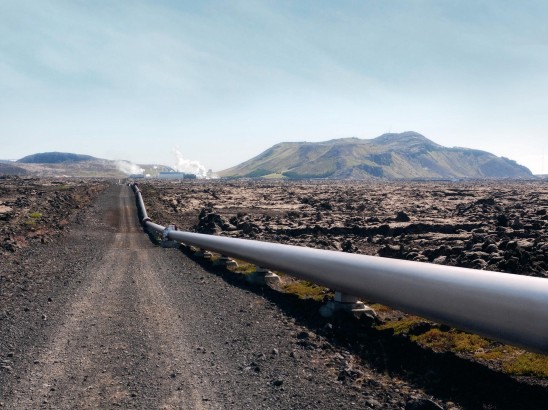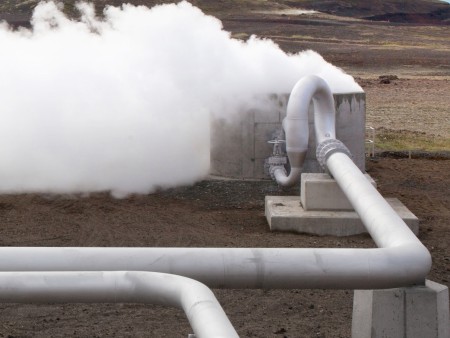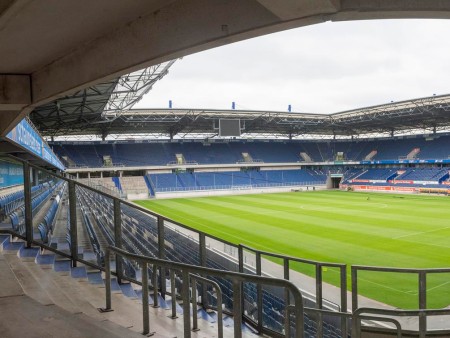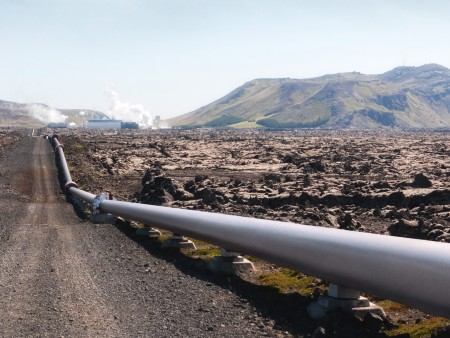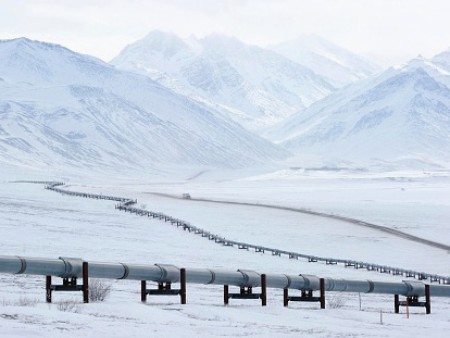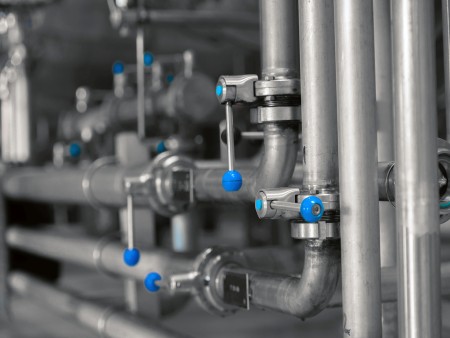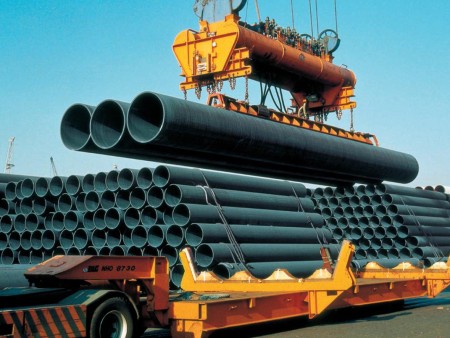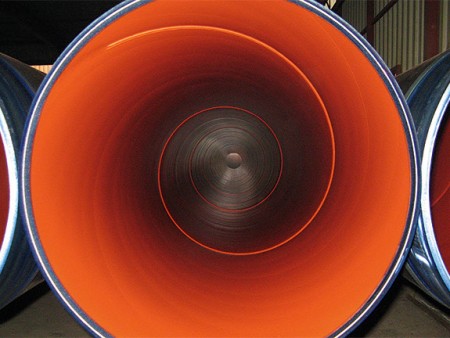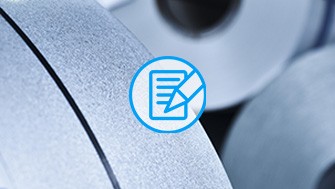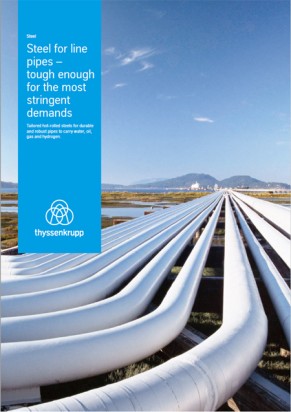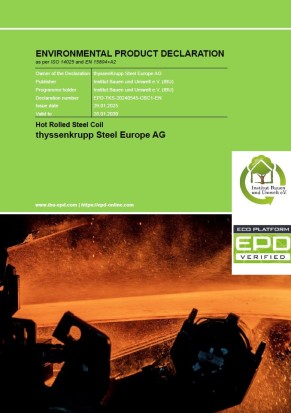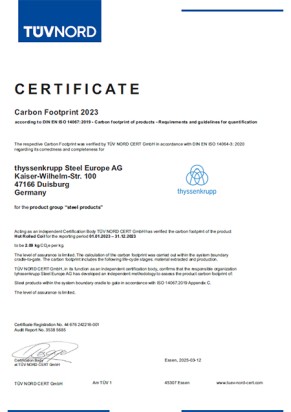Line pipes for oil and other flammable liquids, natural gas and other gaseous media.

Line pipes for oil and other flammable liquids, natural gas and other gaseous media
The oil and gas industry uses pipelines as a safe means of transporting oil and gas over long distances. Steel is the ideal material for pipeline transportation systems in terms of safety, reliability, robustness and durability. Our pipe steel grades for line pipes used to convey liquid and gaseous media are available in normalized or thermomechanically rolled delivery conditions. Apart from a low carbon content and the resulting good weldability, thermomechanically rolled pipe steels feature excellent toughness properties - an important characteristic for pipes that have to withstand high operating pressures.
Aside from the standard grades for oil and gas pipes, our portfolio also includes special steels for the transport of media contaminated with hydrogen sulfide (H2S) in accordance with API 5L, Annex H, and DIN EN ISO 3183. In our in-house corrosion laboratory, which is accredited according to ISO 17025, DaKKS and ARAMCO, we carry out corresponding tests for sour gas resistance according to common NACE regulations, even for high corrosion resistance requirements.
Our newly developed high-ductility steels set new standards in the safe and efficient transport of CO2 for Carbon Capture and Storage (CCS) applications. These specially designed steels up to X70 exceed the requirements of ISO 27913 and offer an exceptional combination of strength, toughness, and brittle fracture resistance for use under demanding operating conditions.
Embrace the future with state-of-the-art materials from thyssenkrupp Steel. We provide sustainable solutions for the challenges of the energy transition.
Steels for line pipes for the conveyance of oil and other flammable liquids, natural gas and other gaseous media / Steels for CO2 transportation pipelines
API 5L/DIN EN ISO 3183 PSL 2 + DWTT
(Sour service on request)
| API 5L/DIN EN ISO 3183 PSL 21 |
With Battelle drop weight tear test (DWT test)3 |
|||
|---|---|---|---|---|
| Steel grade |
THICKNESS2 from _ to in mm |
WIDTH2 max. in mm |
THICKNESS2 from _ to in mm |
WIDTH2 max. in mm |
| L245/Grade B | 3.00 – 25.40 | 2,000 | on request | on request |
| L290/X42 | 3.00 – 25.40 | 2,000 | on request | on request |
| L360/X52 | 3.00 – 25.40 | 2,000 | on request | on request |
| L415/X60 | 3.00 – 25.40 | 1,900 | 7.00 – 20.00 | 1,900 |
| L450/X65 | 3.00 – 25.40 | 1,900 | 7.00 – 23.00 | 1,900 |
| L485/X70 | 3.00 – 23.00 | 1,900 | 7.00 – 23.00 | 1,900 |
| L555/X80 | on request | on request | on request | on request |

For the hydrogen infrastructure of tomorrow: H2-optimized steels for safe and durable pipeline transportation systems
Apart from the low-alloy steel grades X42 and X52 which are suitable for the transport of gaseous hydrogen and hydrogen mixtures in accordance with EIGA Guideline IGC Doc 121/14, our range includes optimized material concepts for the strength range up to X70. These steels are optimized with regard to the expected standard requirements of longitudinal and spiral welded pipes for the transport of hydrogen, in particular with regard to restricted contents of carbon, phosphorus and sulfur.
Steels for the transport of hydrogen (H2)
EIGA Guideline IGC Doc 121/14 and H2 readiness for steels according to API 5L/ISO 3183
| Steel grade EIGA Guideline |
THICKNESS1 from _ to in mm |
WIDTH1 max. in mm |
|---|---|---|
| X42 | 3.00 – 25.40 | 2,000 |
| X52 | 3.00 – 25.40 | 2,000 |
| H2 readiness for steels according to API 5L/ISO 3183 | ||
| X60 | 7.00 – 20.00 | 1,900 |
| X65 | 7.00 – 23.00 | 1,900 |
| X70 | 7.00 – 23.00 | 1,900 |

Oil country tubular goods made of steel
Two types of OCTG pipe have proven their value for use as oil country tubular goods (OCTG) for the production of oil and gas: Tubings and casings. Our portfolio includes special steels for OCTG applications according to API 5CT.
Steel for oil country tubular goods (OCTG)
API 5CT
| Steel grade |
THICKNESS1 from _ to in mm |
WIDTH1 max. in mm |
|---|---|---|
| H40 | 5.00 – 25.40 | 2,000 |
| J55 | 5.00 – 25.40 | 2,000 |
| K55 and higher2 | 5.00 – 25.40 | 2,000 |

Bring on the water – Steel line pipes for water management
Be it for industrial or wastewater, cooling water, other aqueous liquids or even drinking water (cf. EN 10224) - supply by means of steel line pipes is the optimum solution in terms of cost-effectiveness and safety. Another field of application is district heating pipelines for high pressure loads in accordance with DIN EN 10217. Thanks to their high degree of purity in combination with a matching chemical composition, the steel grades are ideal for welding for the two applications.
Non-alloy steel for tubes for the conveyance of water
EN 10224, API 5L PSL 1
| Steel grade EN 10224 |
THICKNESS1 from _ toin mm |
WIDTH1 max. in mm |
|---|---|---|
| L235 | 3.00 – 25.40 | 2,000 |
| L275 | 3.00 – 25.40 | 2,000 |
| L355 | 3.00 – 25.40 | 2,000 |
| API 5L PSL 1 | ||
| L245/Grade B | 3.00 – 25.40 | 2,000 |
| L290/X42 | 3.00 – 25.40 | 2,000 |
| L360/X52 | 3.00 – 25.40 | 2,000 |
| L415/X60 | 3.00 – 25.40 | 2,000 |
| L450/X65 | 3.00 – 25.40 | 2,000 |
| L485/X70 | 3.00 – 25.40 | 2,000 |
| L555/X80 | on request | on request |

Cold-finished structural pipes for various applications in structural steelwork
Thanks to their high stability combined with low weight, welded steel pipes can be used for a wide variety of structural and mechanical applications:
- Structural steelwork
- Bridge construction
- Mechanical and plant construction
- Vehicle construction
- Special vehicle and agricultural machinery construction
Be it supporting or frame structures for the construction of halls or scaffolding, for railings, posts, stairs and grandstands - we offer the entire range of non-alloy structural steels and fine-grained structural steels for the production of square, rectangular and round hollow sections.
Non-alloy structural steels and fine-grain structural steels for cold formed structural steel pipes
DIN EN 10219-1, API 5L PSL 1
| Steel grade DIN EN 10219-1 |
THICKNESS1 from _ to in mm |
WIDTH1 max. in m |
|---|---|---|
| S275JRH, S275J0H, S75J2H | 3.00 – 25.40 | 2,000 |
| S355JRH, S355J0H, S355J2H | 3.00 – 25.40 | 2,000 |
| S420MH, S420MLH | 3.00 – 20.00 | 1,800 |
| API 5L PSL 1 | ||
| L245/Grade B | 3.00 – 25.40 | 2,000 |
| L290/X42 | 3.00 – 25.40 | 2,000 |
| L360/X52 | 3.00 – 25.40 | 2,000 |
| L415/X60 | 3.00 – 25.40 | 2,000 |
| L450/X65 | 3.00 – 25.40 | 2,000 |
| L485/X70 | 3.00 – 25.40 | 2,000 |
| L555/X80 | on request | on request |
Working flat out for a climate-neutral energy supply

Europe wants to be carbon-neutral by 2050. The use of hydrogen in industrial processes plays a key role here. A high-capacity pipeline network will be built in the coming decades to ensure that the flexible energy source arrives safely at the plant sites. Pipeline steel from Duisburg can play a major role in this.
In impressive 53,000 kilometers long, the European hydrogen network is to be in place by 2040 to supply numerous industrial companies with climate-neutral energy from export regions that are rich in wind, water and solar power. This is the goal of the European Hydrogen Backbone (EHB) initiative. To make it a reality, not only will existing pipelines have to be repurposed, but thousands of kilometers of new pipelines will have to be laid. “After a long dry spell, the major pipe manufacturers are now gearing up for full order books again. This is because the hydrogen not only has to be transported in large quantities, but also stored.” says Axel Duhr, Key Account Manager Line Pipe & Export at thyssenkrupp Steel.
The company is one of the few suppliers of high-quality pipeline steels needed to gradually convert the natural gas and petroleum-based energy supply to hydrogen. The challenge here is to keep transport costs low, so that large quantities of the energy source can be compressed and pumped through the pipelines at high pressure in the future. The infrastructure partners involved are breaking new ground with this project. “Current hydrogen lines are operated at up to 25 bar. Now we’re talking about operating pressures of up to 100 bar or more, as prevails in high-pressure natural gas pipelines, for example,” explains Armin Büttgen, Technical Account Manager in the Sales Industry division. “This raises the question of the extent to which the lines currently used in Germany are up to the new requirements.” How do the steels behave in interaction with hydrogen? And how long and how reliably do the longitudinal and spiral seam tubes withstand the pressure?
Preventing hydrogen embrittlement
The team led by project manager Mark Hirt from thyssenkrupp Steel’s Application Technology department addressed the material issue. Five hot-rolled steels that can currently be used for natural gas and CO2 pipelines according to ISO standard 3183 and API 5L were first compared with the requirements of the applicable codes for hydrogen pipes, such as EIGA guideline IGC Doc 121/14. “Hydrogen can penetrate the pipe, especially in high-strength steels, and cause what are called brittle fractures,” says Mark Hirt. “Our investigations therefore concentrated on the toughness of the materials and their behavior in relation to crack formation.”
Expanding test procedures
The next step will now be to expand the analysis to the new application scenario together with the pipe manufacturers. Armin Büttgen: “Designing a pipeline for the quasi-static operating condition is comparatively simple. The possible harmful influence of fluctuating pressures in hydrogen lines, on the other hand, requires additional consideration. Fracture mechanical characteristic values are required to ensure operational safety. To put it simply, we look at the resistance of the material to crack growth.” thyssenkrupp Steel is ready to meet the growing demands on its specialty steels and optimize existing concepts together with steel pipe producers.
From the point of view of the Duisburg-based materials specialists, it is clear what needs to happen to realize the vision of a European hydrogen infrastructure: “We urgently need the regulatory framework to be clarified, and to have the pipeline industry carry out proactive testing and research activities.”
Ready for hydrogen
For thyssenkrupp Steel, achieving this quality criterion is a desirable goal not only from a sales perspective. Rapid expansion of the hydrogen infrastructure is also essential for the company’s climate transformation.
